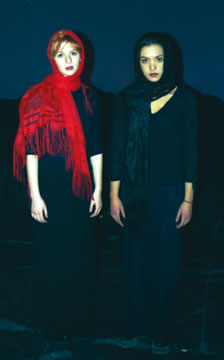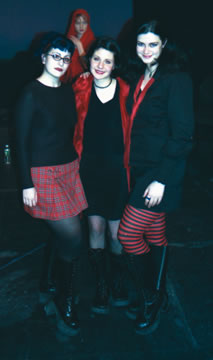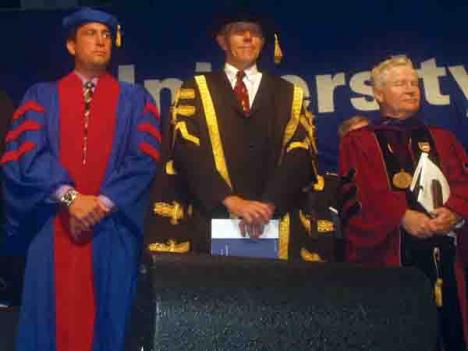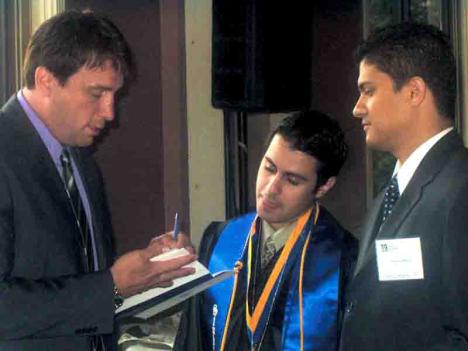The Vagina Monologues

February 20, 2003
For those of you unfamiliar with the other V-Day, here’s a hint: the “v” in this holiday has nothing to do with sending your sweetheart a traditional Hallmark card. This V-Day is not an homage to love and romance but a sobering reminder of the fight to stop violence against women and girls.
Vagina Day, as it is called, is a time for thought and recognition ofthe female struggle through artistic and theatrical events. V-Day at UMB involves raising money for the homeless shelter Rosie’s Place, who failed to show this year, and raising the public consciousness about safe sex with information and condoms handed out by Planned Parenthood.
“The Vagina Monologues,” the focal point for V-Day, began with a series of interviews with women done by author Eve Ensler. The questions emphasized the feelings, conflicts, and curiosity they felt towards exploring the ultimate symbol of female essence – the vagina. “The Vagina Monologues” were then taken and divided into a series of readings and performed like skits ranging from silly to serious, heartbreaking to hilarious.
This year, UMB’s “Vagina Monologues” was directed by Helena Prezio (Artistic Director) and Stephanie Romano (Producer and Director) with the help of Amber Fox (Assistant Director). Incidentally, the trio helped to open the show in an introduction explaining the purpose and intent behind the monologues.
The second monologue was “Hair,” performed by Natalie Mays, and dealing with a woman’s discussion of her pubic hair and her husband’s obsession with shaving it. She despised having it done because it made her feel inferior and uncomfortable. She proceeds to refuse to have it shaved any further. Her husband ends up cheating on her and, when they attend marriage counseling, the therapist encourages her to fulfill her husband’s desire since “marriage is about making compromises.” She lets him and he continues to be unfaithful.
The next is an ensemble recital of each cast member’s statement of what their vagina would wear and say, followed by Kelly DiCarli’s piece “The Flood.” In this amusing and somewhat saddening vignette, DiCarli plays an elderly woman remembering the shame she felt when she had her first orgasm. As a teenager, she unknowingly stained the seats of her date’s car in her excitement and his disgust made her turn her back on what she referred to as “the cellar.” In confining her sexual self to the furthest corners of her mind, she ended up closing her emotional ports off to any incoming lovers.
With “The Vagina Workshop,” Rachel Furst plays a female who’s forgotten where her vagina is. She takes a workshop in order to get in touch with her vagina, “staring at it with a hand-mirror while lying on a little blue mat.” She weeps when she worries that she’s lost her clitoris and cries when she climaxes for the first time. This is one of the monologues with a happier ending.
Here’s a “Vagina Happy Fact,” presented to the audience by Amber Kerner: the clitoris has eight thousand nerve endings, twice as many as the penis and more than any other part of the body.
Imagine a man who will stare at your vagina; your average-looking Joe who decides that you are the epitome of all things beautiful about your vagina. It was as hard for Monica Canfield-Lenfest in “Because He Liked to Look At It” as it is for most women. She plays the part of a woman who feels rather squeamish about her vagina, imagining it as merely furniture or table settings because she is unsettled by it’s appearance. Then she meets Bob, a man who loves vaginas and teaches her that she truly is beautiful, fascinating, and interesting, much like her vagina.
Another ensemble piece ensued, this time detailing the emotions women experienced when they had their periods for the first time in their lives.
The directorial trinity steps up to the plate again to declare in “My Short Skirt” that minis are not an invitation for mayhem. Fox, Prezio, and Romano firmly state that their choice of outerwear does not mean they deserve to be raped, catcalled, or harassed. It is another form of expression that they should not be punished for.
The first glimpse of open rage comes when Sara Boudreau stomps to the center of the stage to let her vagina vent as she goes into the reasons surrounding the need for it in “My Angry Vagina.” Whether it’s tampons or douching, the thrust of this monologue points out that the vagina is a self-cleaning organ that hates to be bothered by “f*cking wads of cotton” and garden-scented sprays. Boudreau lets us know that her vagina is loud and proud, unafraid of any censure she might face.
The pain of war threatens to overcome in “My Vagina Was My Village,” a requiem for the strife seen by Bosnian and Serbian women who have suffered because of the numerous atrocities committed by soldiers against them. Rachel Furst and Natalie Mays, acting as two voices for the different memories residing in one woman’s soul, performed this dual monologue side-by-side. As one describes the beauty of her vagina, another details the torments of rape by various people and implements. Viciously graphic, this is still one of the strongest and most chilling pieces in the entire performance.
In “The Little Coochi Snorcher That Could,” Elizabeth Hanley plays a naïve girl describing the exploration of her own sexuality as only linked with pain. From falling on a bedpost to being punched between the legs to sexual abuse at the hands of her uncle, she feels that nothing good ever comes from her vagina.
This time, the subsequent ensemble piece talks about “the smell” with each of the twelve member crew giving their take on just what their vaginal odor resembles. Another vagina fact follows before the show starts to wind down with the no less incendiary “Reclaiming Cunt.” Monica Canfield-Lenfest states the cursed “c-word” over and over enjoining the audience to scream it out with her. She enjoys each letter, associating it with different words, showing how it fits in with the rest of the world perfectly.
Incongruously, the monologue of a “Six-Year-Old Girl,” performed by Amber Kerner came next, showing an honest and ingenuous Q&A with a little girl who had none of the hang-ups that adults, male and female, may have associated with the word “vagina.”
Bob’s female counterpart shows up in “The Woman Who Loved to Make Vaginas Happy.” Heather Phillips rules this monologue as a former corporate lawyer-turned sex worker who obsesses about the many moans that women are capable of making. She use or do anything to make a woman happy in order to fulfill her “calling.” Phillips has the audience in hysterical tears of laughter including her front-row seated father as she runs through the varieties of aural expression.
The Vagina Monologues closes with a personal piece by the author, Eve Ensler played by Susan Smith, who describes the birth of her granddaughter as what drove her from awe to worship of vaginas. Her daughter, completely exposed at that moment of labor and pain, participates in the mystery and miracle that is life.























































